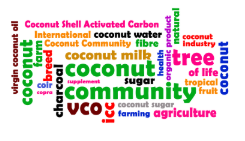WITH CAP REFORMS AND GATT: GREATER MARKET ACCESS FOR COCONUT PRODUCTS?
Abstract
The coconut industry is undeniably an important feature in the economies of the Asia‑Pacific region. It is an important source of income and food. In Vanuatu, this industry contributes 41% to its total export earnings; 7.10% in the Philippines; and 8.91% in the Solomon Islands in 1992. This industry also provides sustenance to the people of Indonesia, Malaysia, India and Sri Lanka. Coconuts are major ingredients in many food preparations in these countries.
References
Asian Development Bank, Industrial Crops in Asia,Agriculture Department, Staff Paper No. 7, August 1993.
Dela Rosa, Romulo, The CAP and the European Market forCoconut Oil and Copra Meal, May 1994.
Department of Agriculture, GATT and PhilippineAgriculture: A Preliminary Brief, 1994
GATT: Agreement on Agriculture (Annex 3). Document MTN/FA II AI A 3, pp 1 25 GATT 1993a
Gardner, B. The Political Outlook for European Community Agriculture. Paper presented during the 12th Annual European Agricultural Outlook Conference, 24th & 25th February 1993.
_______The GATT Uruguay Round: Implications forExports for the Agricultural Superpowers.Briefing Paper, CIIR/SAFE Alliances, December 1993.
_______EU dumping to continue, " The GATT Agreement on Agriculture: will it help developing countries? A report of a CIIR Seminar held at Congress House, Great Russell St., London, 12 April 1994.
INFORM, Vol. 5 no. 4, April 1994.
Watkins, Kevin. "GATT's hidden agenda," The GATT Agreement on Agriculture: Will it help developing countries? A Report of a CIIR Seminar held at Congress House, Great Russell St., London, 12 April 1994.
Oils and Fats International, Vol. 10 No. 2 1994.
Pawanteh, Zurinah. Domestic Marketing of Coconut Products in Malaysia. Jakarta: APCC, November 1992.
Stevens, Christopher. Changes to the External Environment for Agricultural Development, Final Report. University of Sussex:Institute of Development Studies, June 1993.
UCAP Weekly Bulletin, various issues,1993 May 1994.12












